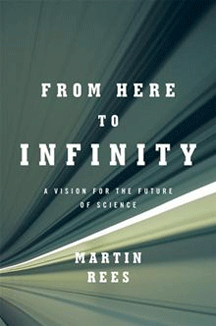By Jay Pasachoff
We have available in this book the musings of one of the wisest and arguably the smartest people in the world, the cosmologist and astrophysicist Martin Rees, now Lord Rees of Ludlow. His theoretical work on black holes gave him renoun among scientists; his administrative and logical skills led him to be Master of Trinity College at Cambridge University (read C. P. Snow’s The Masters to put that title in context) and to be PRS, that is, President of the Royal Society, the standardbearer for science and publication since 1660, as well as being the Astronomer Royal.
This slim volume contains the Reith Lectures that he gave for BBC radio from four different British cities. One of the chapters interestingly cites many of the same historical names and points of the graphic novel Trinity: A Graphic History of the First Atomic Bomb (Hill & Wang, 2012).
Rees is a champion of modern scientific advances: “The innovation driving economic advance—information technology, biotechnology, and nanotechnology—can boost the developing as well as the developed world.” “But who should access the readout of our personal genetic code?… Should we build nuclear power stations, or wind farms…?” He cites Winston Churchill’s call for scientists to be “on tap, not on top.”
Rees decries the lack of public understanding of or even interest in understanding science. “The editors of even the so-called highbrow press feel that they cannot assume that their readers possess the level of knowledge…high school graduates…, whereas the same organs would not talk down to their readers on financial topics or on the arts pages.”
As a call for modesty, Rees cites Alexander Graham Bell’s statement about the telephone that “some day, every town in America will have one.” Still, he discusses the threat of nuclear annihilation, world population trends, and potential responses to and evaluation of climate change.
Are there parallel universes? How does Rees justify the Large Hadron Collider (pre-Higgs claim)? How about the risk-averse nature of NASA, and the probability that the next people on the Moon will be from China?
Rees cites government funding of terrestrial exploration, including Capt. Cook’s three voyages (though he doesn’t specifically mention the transit of Venus of 1769, the impetus for the first). He looks at the current discovery of thousands of planets around other stars and discusses the search for the Goldilocks planet in a habitable zone, as well as the chance of finding extraterrestrial life. He cites both Wittgenstein’s “If a lion could speak, we couldn’t understand him,” and Woody Allen’s “Eternity is very long, especially toward the end.”
We should admire Rees’s call for open and continued scientific research, scientific education for all via the internet and otherwise, and international science in countries everywhere in the world. I can heartily recommend that we all share in the wisdom of this book.
Astronomer and author Jay Pasachoff is the director of Hopkins Observatory and Field Memorial Professor of Astronomy at Williams College.




